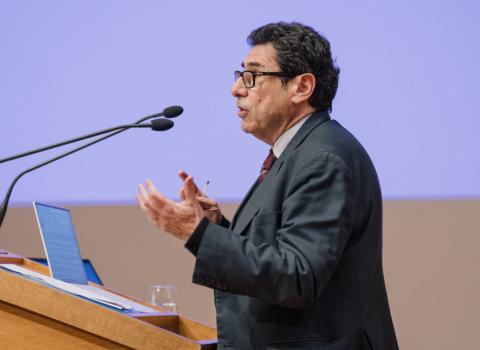For 25 years, the Central European University has promoted academic excellence in the social sciences in Central and Eastern Europe
CEU was founded in 1991 by the billionaire philanthropist George Soros. It offered US-accredited degrees until 2004 when it started issuing both US and Hungarian diplomas in the fields of social sciences, humanities, law, public policy, business management, environmental sciences and mathematics.
The university held its first classes in Prague with around 100 students from 20 countries and moved to Budapest in 1993. CEU now offers 36 masters and 12 PhD programmes to 1,440 students from 108 countries, many of whom focus their studies and research on emerging democracies across the globe.
It has 13 departments, two schools, and 17 research centres focussing on the social sciences, humanities, business, law, and public policy. Its newest addition is the School of Public Policy, which enrolled its inaugural class in 2013.
The university was established in Hungary at a time of democratic reconstruction in Central and Eastern Europe and committed itself to promoting the values of open society and self-reflective critical thinking.
Many alumni are now in key positions in the region, including the Minister of Environmental Protection in Georgia, an advisor to the Iraqi government on public policy development, the first woman of Roma origin to be elected to the European Parliament, and many national parliamentarians, ambassadors, UN officers and human rights activists.
After 25 years of activity, CEU has a network of 13,887 alumni spread across 133 countries who actively donate to the university’s endowment. Their total contribution over the years amounts to $962,485.
Soros is one of the largest contributors to CEU’s endowment, pledging $202 million to the university’s endowment in 2005, which was valued in 2010 at $880 million.
The funding has helped CEU establish itself as a beacon of excellence in Central and Eastern Europe in the fields of humanities and social sciences. It receives more ERC grants than any other university in Hungary, but also in the region, says CEU president and rector Michael Ignatieff.
For the academic year of 2015-2016 CEU spent about €10.6 million on research, but it has also received a lot of funding through external research grants. Between 2011 and 2016, the university was awarded €6,955,221 in European Research Council (ERC) grants, and between 2016 and 2022 the university will receive €14,988,163 in ERC grants.
CEU’s 20 research centres work on 99 ongoing externally funded projects, of which 13 are funded by the ERC, 29 are supported by other EU collaborative grants and 14 Marie Curie actions.
In 2016, CEU took out a €17,000,000 loan to revamp its campus in Budapest.
Soros versus Orban
As founder of the CEU, Soros has injected his philosophy of open society into the university’s strategy. Last year, Ignatieff announced the start of a campaign to rethink those values in the wake of recent world events, such as increasing migration, Brexit, Donald Trump’s election and growing income inequalities.
The university has been critical of Hungarian prime minister Viktor Orban’s policies regarding the refugee crisis and looming nationalism. “More than ever, we need to stand for open minds and open frontiers,” said Ignatieff.
This is at odds with Orban’s intensified push to establish what he calls an “illiberal democracy”. He has attacked Soros’ Open Society Foundation (OSF), and other non-governmental organisations funded by the foundation.
CEU is the most recent victim of the ideological crossfire between Orban and Soros. A proposed amendment to the Hungarian higher education law would bar the university from issuing US-accredited degrees and require it to open a campus in the US.





 A unique international forum for public research organisations and companies to connect their external engagement with strategic interests around their R&D system.
A unique international forum for public research organisations and companies to connect their external engagement with strategic interests around their R&D system.